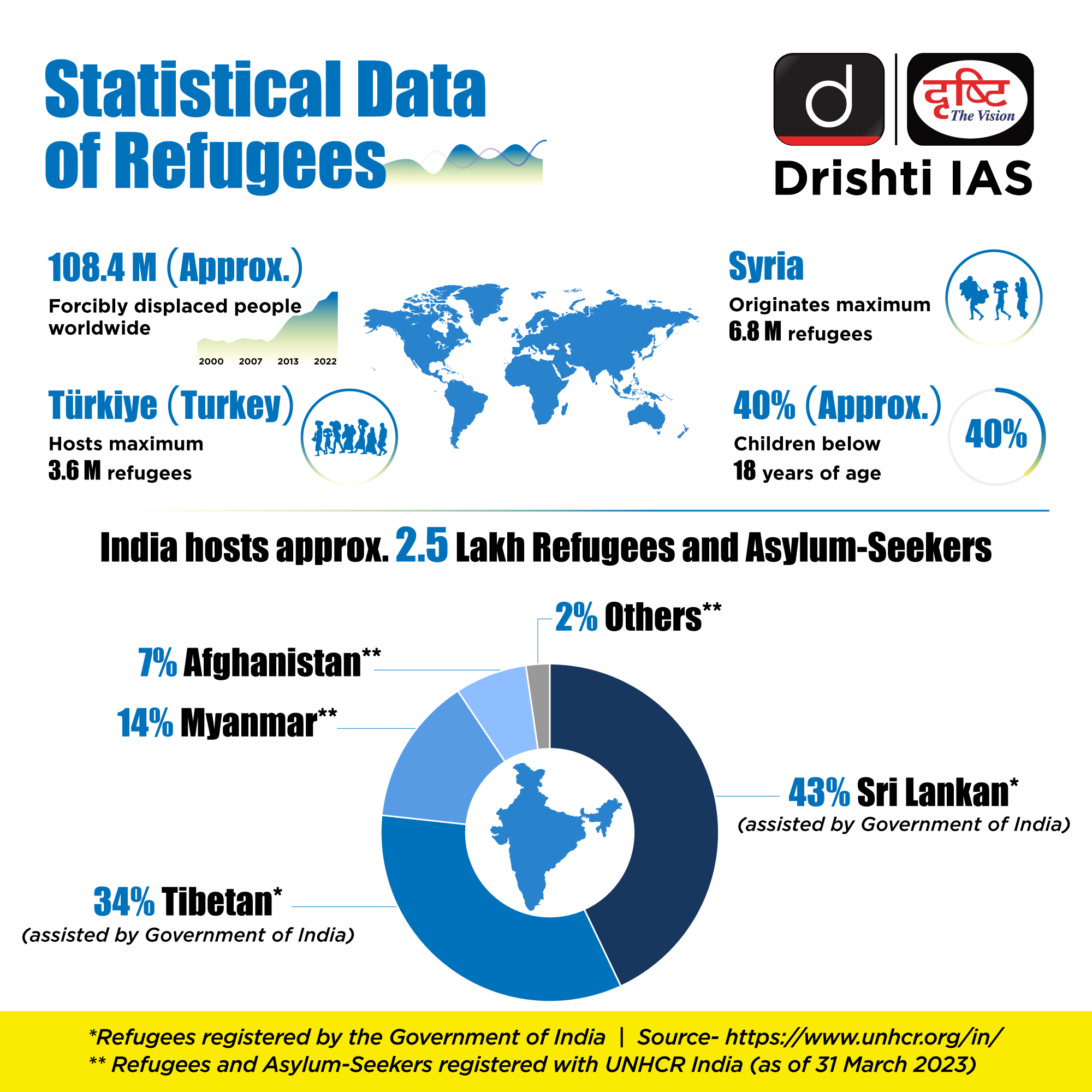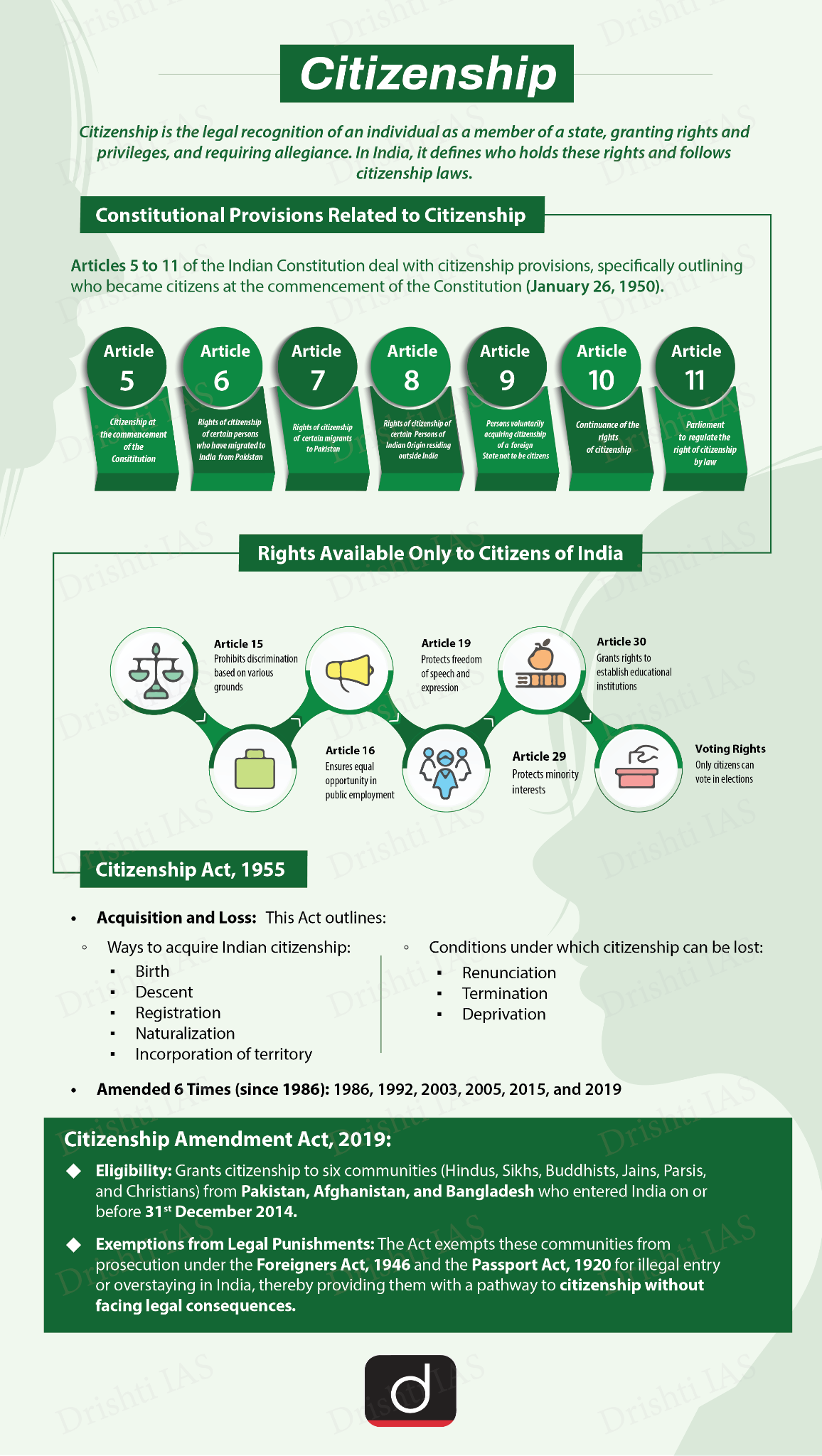International Relations
Sri Lankan Tamil Refugees' Struggle for Indian Citizenship
- 22 Jan 2025
- 13 min read
For Prelims: Sri Lankan Tamil refugee, Liberation Tigers of Tamil Eelam, Article 21, Rohingya refugees, Acquisition of Indian Citizenship, United Nations High Commission for Refugees
For Mains: Statelessness and its implications for human rights, Citizenship in India, Challenges faced by refugees in India, Ethnic violence in Sri Lanka and its impact on India
Why in News?
The Madurai Bench of the Madras High Court has instructed the Union Ministry of Home Affairs to consider the Indian citizenship application of a Sri Lankan Tamil refugee, who has been residing in India since 1984.
- This directive emphasizes the rights of Sri Lankan Tamil refugees under Indian law.
Note: A Sri Lankan Tamil refugee, born in Sri Lanka in 1975, moved to India in 1984 due to ethnic conflict. The individual applied for Indian citizenship in 2022 under Section 5(1)(a) of the Citizenship Act, 1955, but no action was taken.
- Despite residing in India for over 40 years, the person remains without citizenship, hoping for legal recognition.
- The recognition could expedite citizenship for other long-term refugees, especially those who fled during the ethnic conflict in Sri Lanka.
What is the Plight of Sri Lankan Tamil Refugees?
- Historical Background: Indian-origin Tamils were brought to Sri Lanka by the British during colonial times as indentured laborers for plantation work.
- Social Isolation: These Tamils were largely excluded from the political and civil life of Sri Lanka, facing marginalisation from both the Sinhalese (people of Sri Lanka) and native Tamil communities.
- Post-1948 Struggles: After Sri Lanka's independence (1948), rising Sinhalese nationalism further disenfranchised Indian-origin Tamils, who were denied citizenship rights and relegated to statelessness (a person is not recognized as a citizen by any country).
- Bilateral Agreements: The Sirimavo-Shastri Pact (1964) and Sirimavo-Indira Gandhi Pact (1974) outlined that up to six lakh Indian-origin Tamils and their descendants could be granted Indian citizenship, but this process stalled due to various factors, including the Sri Lankan civil war.
- CAA 2003: Indian-origin Tamils who returned to India before 1982 were granted citizenship, but subsequent arrivals after 1983 were categorized as 'illegal migrants' under the Citizenship (Amendment) Act (CAA) 2003.
- Indian-origin Sri Lankan Tamils refugees, who fled the Civil War in Sri Lanka fought between the separatist Tamil forces (Liberation Tigers of Tamil Eelam (LTTE)) and the Sri Lankan government from 1983 to 2009, are not eligible for Indian citizenship despite living in India for decades.
- The lack of a formal refugee law leaves refugees in legal uncertainty, with no clear path to citizenship or permanent status.
- Indian-origin Sri Lankan Tamils refugees, who fled the Civil War in Sri Lanka fought between the separatist Tamil forces (Liberation Tigers of Tamil Eelam (LTTE)) and the Sri Lankan government from 1983 to 2009, are not eligible for Indian citizenship despite living in India for decades.
- Court Rulings: Madras High Court in P. Ulaganathan vs Government of India, 2019 case, emphasized that their exclusion infringes upon the right to life and personal liberty (Article 21 of the Constitution), making the case for an urgent resolution.
- In the Abirami S. vs Union of India (2022) case, the Madras High Court called for a humanitarian approach to grant citizenship to Indian-origin Tamils, supporting the principles of the Citizenship (Amendment) Act (CAA) 2019, which eases citizenship conditions for Hindus from Afghanistan, Pakistan, and Bangladesh.
Refugees In India
- About: Refugees are individuals who have fled their countries due to severe threats to their life, safety, or freedom, requiring international protection from persecution, armed conflict, violence, or public unrest.
- India's Refugee Asylum History: India has historically hosted various refugee groups, including Tibetans fleeing Chinese occupation, Bangladeshi refugees post-1971 war, Sri Lankan Tamils, and Rohingya refugees (Myanmar).
- India’s Challenges in Managing Refugees:
- Lack of Legal Framework: India is not a signatory to the 1951 Refugee Convention, leading to no clear legal definition of refugees, which complicates distinguishing between economic migrants and genuine refugees.
- Indian law does not recognize any illegal immigrant as a refugee and is concerned about compromising sovereignty and potential security risks from refugees.
- Porous Borders: India's porous borders make regulating refugee entry difficult, leading to influxes, especially in Assam and West Bengal, overwhelming local resources and infrastructure.
- Limited Resources: India's limited resources and infrastructure hinder its ability to assist and integrate refugees, restricting access to basic services like education, healthcare, and employment.
- Lack of Legal Framework: India is not a signatory to the 1951 Refugee Convention, leading to no clear legal definition of refugees, which complicates distinguishing between economic migrants and genuine refugees.
What are the Challenges Faced by Stateless Individuals?
- Lack of Basic Rights: Stateless individuals are often denied fundamental rights like education, healthcare, and social services, as they don't have recognized citizenship.
- Limited Legal Protection: Without legal status, stateless refugees are vulnerable to exploitation, including forced labor, human trafficking, and other forms of abuse, as they lack the protection that nationality and legal status afford.
- Economic Exclusion: They often cannot work legally, open bank accounts, or access public welfare programs, leading to economic insecurity.
- Social Marginalization: Stateless individuals face social exclusion and discrimination, both from state authorities and society, leading to isolation and a lack of integration.
- Intergenerational Impact: Statelessness can be passed down through generations, leading to a cycle of deprivation and disenfranchisement.
- Stateless children may lack property inheritance, parental support, and legal protections. This uncertainty can lead to mental health issues like anxiety, and depression.
What is the Process of Acquisition of Indian Citizenship?
- India's citizenship laws incorporate both jus soli and jus sanguinis principles, balancing birthright and descent in the framework.
- ‘Jus soli’ grants citizenship based on birthplace, while ‘jus sanguinis’ recognizes blood ties.
- Indian citizenship can be acquired by birth, descent, registration and naturalization, as outlined in the Citizenship Act, 1955.
- By Birth: Persons born in India between 26th January 1950 and 1st July 1987 are Indian citizens regardless of parentage.
- Between 1st July 1987 and 2nd February 2004, if at least one parent is an Indian citizen, the child is a citizen.
- After 3rd December 2004, both parents must be Indian or one must be Indian and the other not an illegal migrant.
- By Registration: Citizenship can be acquired by registration under certain conditions, such as a person of Indian origin who has resided in India for 7 years ( Section 5(1)(a)).
- Persons of Indian origin who are ordinarily residents in any country or place outside undivided India.
- Spouses of Indian citizens who have been residing in India for 7 years before applying for registration.
- Minor children of Indian citizens.
- By Descent: A person born outside India on or after 26th January 1950, is a citizen by descent if their father was an Indian citizen by birth.
- For those born between 10th December 1992, and 3rd December 2004, either parent must be an Indian citizen by birth.
- After 3rd December 2004, parents must declare the child does not hold another passport, and the birth must be registered at an Indian consulate within one year.
- By Naturalization: Requires 12 years of residence in India, and fulfills all qualifications in the third schedule of the Citizenship Act.
- By Birth: Persons born in India between 26th January 1950 and 1st July 1987 are Indian citizens regardless of parentage.
Citizenship Amendment Act (CAA), 2019
- About: The CAA, 2019 amends the Citizenship Act, 1955, that provides a path to citizenship in India for certain illegal migrants from Afghanistan, Bangladesh, and Pakistan.
- Eligible for Indian citizenship under CAA, 2019: Persons from the Hindu, Sikh, Buddhist, Jain, Parsi, or Christian communities in Afghanistan, Bangladesh, or Pakistan.
- Entered India on or before 31st December 2014.
- Exempted individuals under section 3(2)(c) of the Passport (Entry into India) Act, 1920 or from the application of the provisions of the Foreigners Act, 1946 or any rule or order made thereunder.
- These laws penalize illegal entry and overstaying in India.
Way Forward
- Legislative Action: The Indian government must take corrective legislative action to grant citizenship to Indian-origin Tamils, including those who arrived post-1983. This may require retroactive measures to manage statelessness.
- According to the United Nations High Commission for Refugees (UNHCR), there are around 29,500 Indian-origin Tamils currently living in India, and India has a moral and legal obligation to provide them with a pathway to citizenship.
- Naturalization Process: Simplify and expedite the process for Sri Lankan Tamil refugees to acquire Indian citizenship, based on residence (Naturalization) and integration.
- Humanitarian Approach: The government must adopt a compassionate and humanitarian stance, going beyond legal technicalities to restore the dignity and rights of Indian-origin Tamils.
- Implement programs for vulnerable groups, like UNHCR's "Safe from the Start" in Ethiopia, to prevent sexual and gender-based violence in refugee camps.
- Reconciliation: Foster dialogue and peace-building efforts between refugees and local communities to enhance social cohesion.
Read more: Issue of Tamilians in Sri Lanka
|
Drishti Mains Question: Discuss the legal challenges faced by Sri Lankan Tamil refugees in India. How does their statelessness affect their access to basic rights and services? |
UPSC Civil Services Examination, Previous Year Question:
Prelim
Q. Consider the following pairs: (2016)
|
Community sometimes mentioned in the news |
In the affairs of |
|
1. Kurd |
Bangladesh |
|
2. Madhesi |
Nepal |
|
3. Rohingya |
Myanmar |
Which of the pairs given above is/are correctly matched?
(a) 1 and 2
(b) 2 only
(c) 2 and 3
(d) 3 only
Ans- C
Mains
Q. “Refugees should not be turned back to the country where they would face persecution or human right violation.” Examine the statement with reference to the ethical dimension being violated by the nation claiming to be democratic with open society. (Mains 2021)






